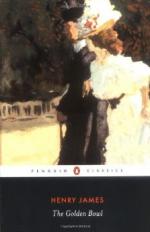It was extraordinary how scant a series of signs she had invited him to make of being, of truly having been at any time, “with” his wife: that reflection she was not exempt from as they now, in their suspense, supremely waited—a reflection under the brush of which she recognised her having had, in respect to him as well, to “do all,” to go the whole way over, to move, indefatigably, while he stood as fixed in his place as some statue of one of his forefathers. The meaning of it would seem to be, she reasoned in sequestered hours, that he had a place, and that this was an attribute somehow indefeasible, unquenchable, which laid upon others—from the moment they definitely wanted anything of him— the necessity of taking more of the steps that he could, of circling round him, of remembering for his benefit the famous relation of the mountain to Mahomet. It was strange, if one had gone into it, but such a place as Amerigo’s was like something made for him beforehand by innumerable facts, facts largely of the sort known as historical, made by ancestors, examples, traditions, habits; while Maggie’s own had come to show simply as that improvised “post”—a post of the kind spoken of as advanced—with which she was to have found herself connected in the fashion of a settler or a trader in a new country; in the likeness even of some Indian squaw with a papoose on her back and barbarous bead-work to sell. Maggie’s own, in short, would have been sought in vain in the most rudimentary map of the social relations as such. The only geography marking it would be doubtless that of the fundamental passions. The “end” that the Prince was at all events holding out for was represented to expectation by his father-in-law’s announced departure for America with Mrs. Verver; just as that prospective event had originally figured as advising, for discretion, the flight of the younger couple, to say nothing of the withdrawal of whatever other importunate company, before the great upheaval of Fawns. This residence was to be peopled for a month by porters, packers and hammerers, at whose operations it had become peculiarly public—public that is for Portland Place—that Charlotte was to preside in force; operations the quite awful appointed scale and style of which had at no moment loomed so large to Maggie’s mind as one day when the dear Assinghams swam back into her ken besprinkled with sawdust and looking as pale as if they had seen Samson pull down the temple. They had seen at least what she was not seeing, rich dim things under the impression of which they had retired; she having eyes at present but for the clock by which she timed her husband, or for the glass—the image perhaps would be truer—in which he was reflected to her as he timed the pair in the country. The accession of their friends from Cadogan Place contributed to all their intermissions, at any rate, a certain effect of resonance; an effect especially marked by the upshot of a prompt exchange of inquiries between Mrs. Assingham and the Princess. It was noted, on the occasion of that anxious lady’s last approach to her young friend at Fawns, that her sympathy had ventured, after much accepted privation, again to become inquisitive, and it had perhaps never so yielded to that need as on this question of the present odd “line” of the distinguished eccentrics.




